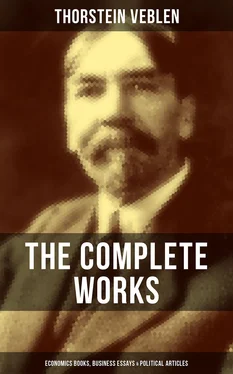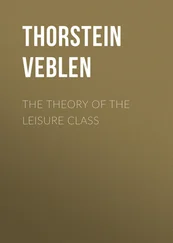Modern civilisation, and indeed all history for that matter, lies within the pecuniary culture as a whole; but the Western culture of modern times belongs, perhaps somewhat precariously, to the secondary or peaceable phase of this pecuniary culture, rather than to that preda-tory phase with which the pecuniary scheme of life began somewhere in the lower barbarism, and that has repeatedly closed its life cycle in the collapse of one and another of the great dynastic empires of the old world.
As in the predatory phase, so also in the peaceable pecuniary culture, the dominant note is given by the self-regarding impulses; and the sense of workmanship is therefore characteristically hedged about and guided by the institutional exigencies and preconceptions incident to life under the circumstances imposed by ownership, - in a situation where the economic interest, the interest in those material means of life with which workmanship has to deal, converges on property rights. Ownership is self-regarding, of course, and the rights of ownership are of a personal, invidious, differential, emulative nature; although in the peaceable phase of the civilisation of ownership, force and fraud are, in theory, barred out of the game of acquisition, - wherein this differs from the predatory phase proper.
An obvious consequence following immediately on the emergence of ownership in any community is an increased application to work. This has been taken as a matter of course in theoretical speculations and is borne out by the observation of peoples among whom trade relations have been introduced in recent times. An immediate result is greater diligence, accompanied apparently in all cases, if the reports of observers are to be accepted, by an increase in contention, distrust and chicanery 107and an increasingly wasteful consumption of goods. The diligence so fostered by emulative self-interest is directed to the acquisition of property, in great part to the acquisition of more than is possessed by those others with whom the invidious comparison in ownership is made; and under the spur of ownership simply, it is only secondarily, as a means to the emulative end of acquisition, that productive work, and therefore workmanship in its naive sense, comes into the case at all. Ownership conduces to diligence in acquisition and therefore indirectly to diligence in work, if no more expeditious means of acquiring wealth can be devised. In its first incidence the incentive to diligence afforded by ownership is a proposition in business not in workmanship. Its effects on workmanship, industry and technology, therefore, are necessarily somewhat uncertain and uneven.
Apparently from the start there is some appreciable resort to fraudulent thrift, to the production of spurious or inferior goods. 108This of course very presently is corrected in the increased astuteness and vigilance exercised in men’s dealings with one another, whereby an appreciable portion of energy goes to defeat these artifices of disingenuous worldly wisdom.
It should be added that the pecuniary incentive to work takes the direction of making the most of the means at hand, considered as means of pecuniary gain rather than as means of serviceability, and that it conduces therefore to the fullest (pecuniary) exploitation of the standard accepted ways and means of industry rather than to the improvement of these ways and means beyond the conjuncture at hand. Further, though this is also somewhat of a tedious commonplace, since the only authentic end of work under the pecuniary dispensation is the acquisition of wealth; since the possession of wealth in so far exempts its possessor from productive work; and since such exemption is a mark of wealth and therefore of superiority over those who have nothing and therefore must work; it follows that addiction to work becomes a mark of inferiority and [is] therefore discreditable. Whereby work becomes distasteful to all men instructed in the proprieties of the pecuniary culture; and it has even become so irksome to men trained in the punctilios of the servile, predatory, phase of this culture that it was once credibly proclaimed by a shrewd priesthood as the most calamitous curse laid on mankind by a vindictive God. Also, since wealth affords means for a free consumption of goods, the conspicuous consumption of goods becomes a mark of pecuniary excellence, and so it becomes an element of respectability in any pecuniary culture, and presently becomes a meritorious act and even a requirement of pecuniary decency. The outcome is conspicuous wastefulness of consumption, the limits of which, if any, have apparently not been approached hitherto. 109The bearings of this pecuniary culture on workmanship and technology are wide and diverse. Most immediate and perhaps most notable is the conventional disesteem of labour spoken of above, which seems to follow as a necessary consequence from the institution of ownership in all cases where distinctions of wealth are at all considerable or where property rights are associated with facts of mastery and prestige. The pecuniary disrepute of labour acts to discourage industry, but this may be offset, at least in part, by the incentive given to emulation by the good repute attaching to acquisition. The wasteful expenditure of goods and services enjoined by the pecuniary canons of conspicuous consumption gives an economically untoward direction to industry, at the same time that it greatly increases the hardships and curtails the amenities of life. So also, estrangement and distrust between persons, classes and nations necessarily pervades this cultural era, due to the incessant gnawing of incompatible pecuniary interests; and this state of affairs appreciably lowers the aggregate efficiency of human industry and sets up bootless obstacles to be overcome and irrelevant asperities to be put up with.
These and the like consequences of pecuniary emulation are simple, direct and obvious; but the discipline of the pecuniary culture bears on workmanship also in a more subtle way, indirect and less evident at first sight. The discipline of daily life imparts its own bent to the sense of workmanship through habituation of the workman to that scheme and logic of things that rules this pecuniary culture. The outcome as concerns industry is somewhat equivocal; the discipline of self-seeking at some points favours workmanship and at others not. At one period or phase of the pecuniary culture, generally speaking an early or crude phase, the bent so given to workmanship and technology seems necessarily to be conducive to inefficiency; at another (later or maturer) phase the contrary is likely to be true.
The pecuniary discipline of invidious emulation takes effect on the state of the industrial arts chiefly and most pervasively through the bias which it gives to the knowledge on which workmanship proceeds. It may be called to mind that the body of knowledge (facts) turned to account in workmanship, the facts made use of in devising technological processes and appliances, are of the nature of habits of thought. This is particularly applicable to those (tactical) principles under whose control the information in hand is construed and connected up into a system of uses, agencies and instrumentalities. These habits of thought, elements of knowledge, items of information, accepted facts, principles of reality, in part represent the mechanical behaviour of objects, the brute nature of brute matter, and in part they stand for qualities, aptitudes and proclivities imputed to external objects and their behaviour and so infused into the facts and the generalisations based on them. The sense of workmanship has much to do with this imputation of traits to the phenomena of observation, perhaps more than any other of the proclivities native to man. The traits so imputed to the facts are in the main such as will be consonant with the sense of workmanship and will lend themselves to a concatenation in its terms. But this infusion of traits into the facts of observation, whether it takes effect at the instance of the sense of workmanship, or conceivably on impulse not to be identified with this instinct, is a logical process and is carried out by an intelligence whose logical processes have in all cases been profoundly biassed by habituation.
Читать дальше












